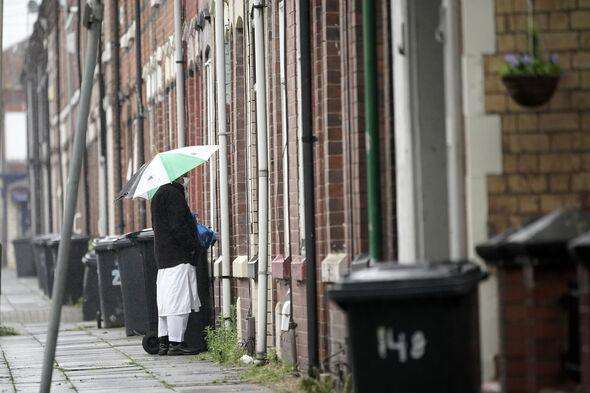In the vibrant, bustling streets of North Evington, Leicester, a community stands at a crossroads, navigating the rich complexities of modern migration. While the influx of global cultures from Asia and Africa has created a colorful, economically active high street—a true testament to the UK's diverse spirit—an unspoken challenge lingers: the struggle for a common tongue.
This is not a story of blame, but one of deep, human longing—for connection, opportunity, and belonging.
Current government census data reveals the scale of this barrier. In North Evington, a staggering 43% of residents aged 16 and over report speaking little to no English. This microcosm of multilingual life, less than 10 minutes from the city center, is home to a tapestry of languages, including West and East Asian languages, African dialects, Arabic, Portuguese, and French.
The lack of English proficiency, a challenge also seen in areas like Smethwick, Elswick, and parts of Aldershot, impacts nearly a million people across England who struggle with a basic level of the language. This isn't just a statistical shortfall; it's a human barrier to full, dignified participation in British life.
The Voices of the Community: A Shared Frustration
What the headlines often miss is that the push for English isn't a demand from one side; it's a plea from within the migrant community itself.
Mohammed, 50, a settled immigrant from Pakistan and a local business owner, speaks with profound concern. Having mastered English upon his arrival, he understands its power as a tool for success. "People come here and they only want to speak their native language, they don't want to get into English, and that’s very disheartening," he shared. His sentiment echoes the reality that for students and new workers, English is foundational—not just for studies, but for navigating employment, healthcare, and daily interactions.
This view is shared by the newer generation, like Dev Mistri, a 21-year-old Masters student from India who took the initiative to learn English before moving. He sees it as an essential bridge. The reality, however, is that while the youth—including those born in North Evington—are eager to learn, they often face a language gap with their older relatives.
Conservative councillor Sanjay Modhwadia, 59, provides critical historical context, explaining that older migrants once found work in local clothing factories where a shared native language was sufficient. "They didn't bother to learn English" because it wasn't a necessity for survival in those closed-loop industries. This was an economic reality, not a choice of cultural segregation.
A Pathway to Integration, Not Segregation
Experts and political figures agree that the ability to speak English is the "entry ticket" to British life. Political scientist and migration expert Dr. Mike Jones warns that without it, individuals risk being "stuck in low-paid jobs and cut off from the English-speaking majority." This isolation is what fuels inward-turning communities, leading to tension and social division.
However, the conversation must shift from punitive measures to compassionate solutions. While Shadow Home Secretary Chris Philp and other political voices have advocated for stricter visa requirements and cuts to taxpayer-funded translation services to prevent "segregation," these measures overlook the core issue: the lack of accessible, high-quality language education.
As Cllr Modhwadia pointed out, government information about language classes is often distributed in English, creating a cruel irony for those who need it most. This highlights a systemic failure to provide culturally sensitive, accessible, and affordable ESOL (English for Speakers of Other Languages) resources.
Integration is a two-way street. It requires newcomers to make the effort to learn, but it equally requires the government and local authorities to remove the barriers that prevent that learning.
Updated Realities and the Way Forward
As of the 2021 Census, the proportion of residents listing English as their main language in England has fallen to 91.1% (down from 92.3% in 2011). The most common alternative languages are Polish, Romanian, Punjabi, and Urdu. This diversity is a strength, but only if a foundation of shared communication is maintained.
While politicians across the spectrum—including Labour and Reform UK—have signaled plans to raise English language standards for visas, a vital need remains for those already settled.
The Solution Requires Empathy and Investment:
- Culturally Sensitive Outreach: Fund and launch targeted, multilingual campaigns to advertise ESOL classes, meeting people where they are in community centers, mosques, and temples.
- Flexible and Affordable Classes: Subsidize or offer free, quality ESOL courses with flexible hours to accommodate working parents and those with challenging work schedules.
- Digital Literacy & Language Integration: Leverage the potential of AI tools and online learning to offer accessible, self-paced learning, as suggested by a younger resident.
- Support for Older Generations: Develop specialized language programs that acknowledge the unique historical and employment factors that prevented older migrants from learning English earlier.
The goal isn't to erase the beautiful, multilingual character of places like North Evington, but to ensure that every resident has the tool—the English language—needed to unlock their full potential, access public services easily, and fully contribute to the national economy and social fabric. Investing in language is investing in a stronger, more united British future.
_4.jpg)

_4.jpg)




.svg)
